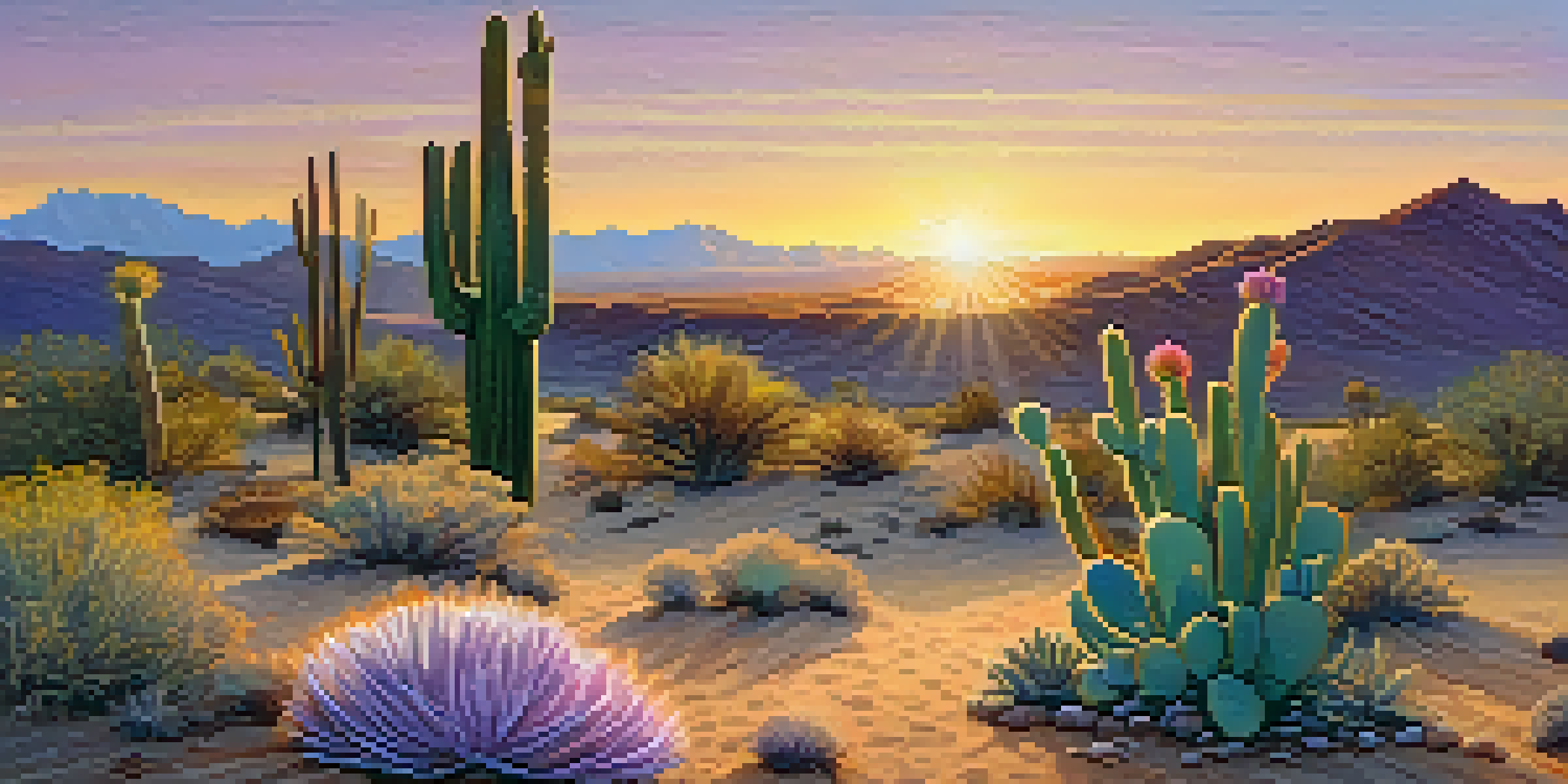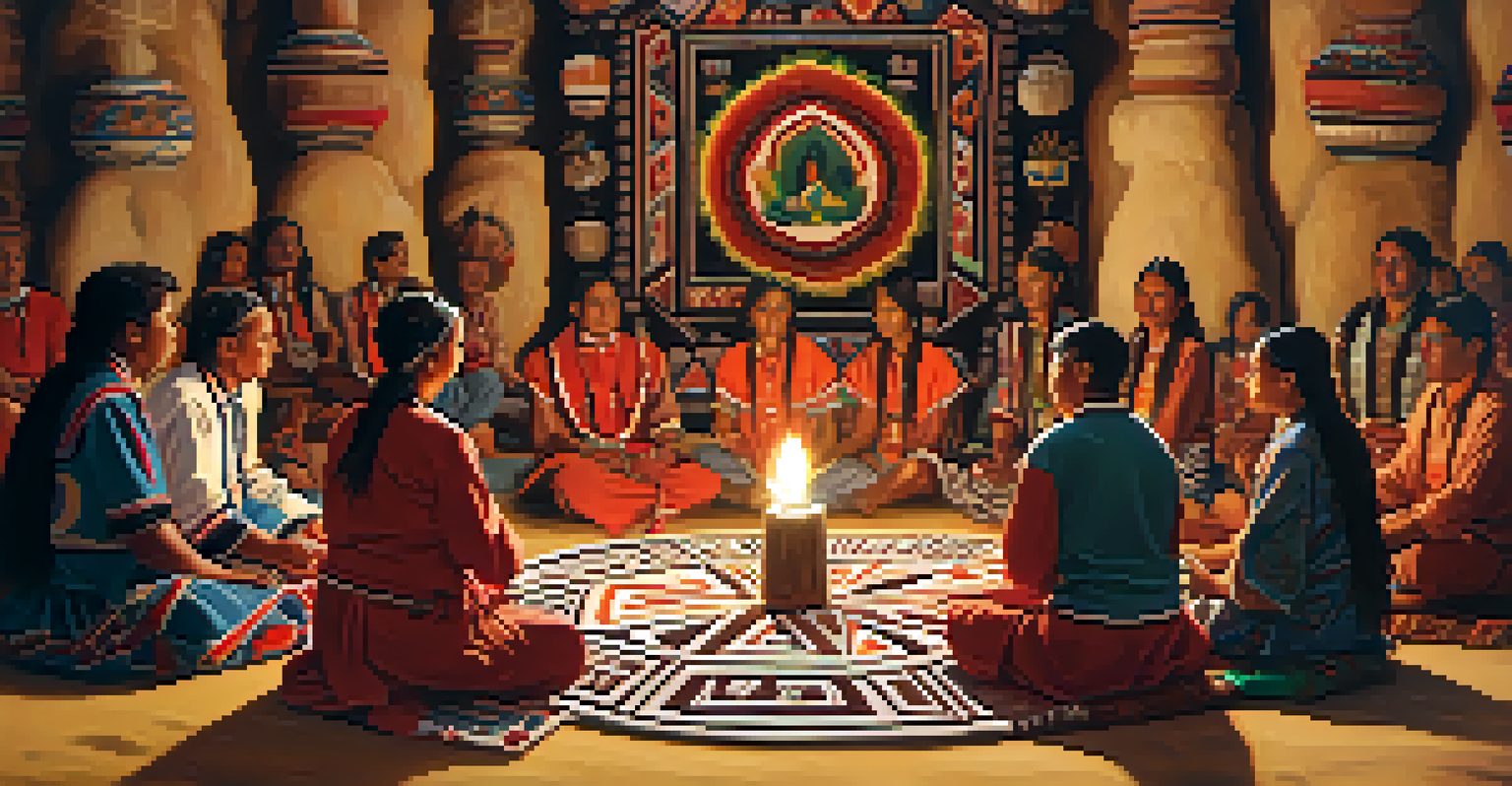Psychedelics in Spirituality: Peyote's Unique Contribution

An Introduction to Peyote and Its Spiritual Importance
Peyote, a small, spineless cactus native to Mexico and the southwestern United States, has been used for thousands of years in spiritual practices. Traditionally, Indigenous communities have utilized this powerful plant in religious ceremonies to foster deep spiritual connections. The psychoactive compound, mescaline, found in peyote is known to induce profound alterations in consciousness, making it a key element in various rituals.
The use of peyote is a sacred tradition, a bridge to the divine, and a powerful tool for self-discovery.
For many, peyote serves not only as a tool for spiritual exploration but also as a bridge to the divine. When consumed, it facilitates introspection, allowing users to reflect on their lives, beliefs, and connections to the universe. This unique experience often results in a heightened sense of awareness and a feeling of unity with all living things.
Beyond individual experiences, peyote plays a vital role in communal rituals, reinforcing social bonds among participants. These ceremonies create a shared space for healing, growth, and understanding, illustrating how peyote is much more than just a psychedelic; it's a catalyst for spiritual transformation.
The Role of Peyote in Indigenous Spiritual Practices
Indigenous peoples, particularly those from the Native American Church, have incorporated peyote into their spiritual practices for generations. Its use is often framed within the context of religious freedom, allowing practitioners to engage with their spirituality in a deeply personal way. The peyote ceremony is a sacred ritual that often centers around prayer, singing, and storytelling, creating a rich tapestry of cultural significance.

During these ceremonies, participants consume peyote to induce altered states of consciousness, which they believe facilitate direct communication with the spiritual realm. This communion is thought to provide guidance, clarity, and healing, essential aspects of many Indigenous belief systems. The process is highly communal, reinforcing the importance of togetherness in spiritual journeys.
Peyote's Spiritual Significance
Peyote has been used for thousands of years in Indigenous spiritual practices, fostering deep connections and introspection.
Moreover, the use of peyote in these practices highlights the importance of maintaining cultural traditions and preserving ancestral knowledge. As modern society increasingly embraces alternative spiritual practices, Indigenous communities continue to advocate for the recognition and respect of their sacred traditions associated with peyote.
Psychedelics and the Quest for Spiritual Enlightenment
The quest for spiritual enlightenment has led many individuals to explore psychedelics, with peyote often at the forefront. Users frequently report transformative experiences that challenge their perceptions of reality, self, and existence. This journey can lead to a clearer understanding of one's purpose and place in the world, as well as a deeper connection to nature and the cosmos.
Psychedelics can help us confront our fears, heal our traumas, and gain clarity about our purpose in life.
Psychedelics like peyote can act as a catalyst for spiritual awakening, helping individuals confront personal challenges and traumas. By fostering a sense of surrender, users may find themselves more open to receiving insights and wisdom during their journeys. This openness is crucial in navigating the complexities of life and understanding one's spiritual path.
As research into the therapeutic benefits of psychedelics grows, there is an increasing recognition of their potential for spiritual development. Many are turning to peyote and other psychedelics as tools for self-discovery, healing, and reconnecting with their spiritual roots.
Personal Stories: Transformative Peyote Experiences
Personal accounts of peyote experiences often highlight the profound impact the substance can have on an individual's spiritual journey. Many users describe their journeys as eye-opening, leading to revelations about their lives, relationships, and the universe. These stories not only illustrate the potential for personal growth but also the importance of sharing these experiences within a community.
One individual might recount a peyote ceremony that led them to confront long-held fears, ultimately resulting in a newfound sense of peace and acceptance. Another may share how the experience allowed them to reconnect with lost loved ones, providing closure and healing. These narratives are powerful reminders of the transformative potential of peyote in fostering spiritual connections.
Cultural Challenges and Respect
As interest in peyote grows, it's crucial to address cultural appropriation and ensure respect for Indigenous traditions.
These personal stories also highlight the need for responsible use and deeper understanding of peyote's effects. Sharing experiences within a community framework can help individuals navigate the complexities of their journeys, allowing for collective healing and growth as they explore their spirituality.
Understanding the Science Behind Peyote's Effects
The effects of peyote can be attributed to its active compound, mescaline, which interacts with serotonin receptors in the brain. This interaction leads to alterations in perception, mood, and cognition, allowing users to experience profound shifts in consciousness. Understanding these scientific aspects can help demystify the peyote experience and provide insight into its spiritual significance.
Research has indicated that psychedelics like mescaline can promote neuroplasticity, fostering new connections in the brain. This can lead to lasting changes in thought patterns and emotional responses, further enhancing the potential for personal and spiritual growth. The ability to rewire the brain may explain why many individuals report lasting positive effects from their peyote experiences.
Additionally, the science behind psychedelics supports the idea that they can facilitate profound spiritual experiences by altering both perception and emotional states. This understanding underscores the importance of responsible use and integration of these experiences into everyday life, ensuring that the lessons learned during a peyote journey can be applied long after the effects have worn off.
Cultural Challenges: Peyote and Modern Society
As interest in psychedelics grows, so do the challenges surrounding the cultural appropriation of peyote. Many Indigenous communities are concerned about the exploitation of their sacred practices by those outside their cultures. This raises important questions about respect, understanding, and the ethical use of peyote in contemporary society.
Navigating these cultural challenges requires a commitment to education and dialogue. It's essential for individuals interested in peyote to learn about its historical context, cultural significance, and the perspectives of Indigenous communities. By fostering respect and understanding, we can help protect these sacred traditions while promoting responsible use.
Future of Peyote in Spirituality
The future of peyote in spiritual practices hinges on balancing traditional roots with its potential for modern self-discovery and healing.
Moreover, the conversation around peyote's role in spirituality highlights the need for legislation that supports Indigenous rights and access to traditional practices. As society continues to explore the therapeutic benefits of psychedelics, it's crucial to ensure that Indigenous voices are heard and respected in discussions surrounding peyote and its use.
The Future of Peyote in Spiritual Practices
Looking ahead, the future of peyote in spiritual practices is likely to evolve as more people recognize its significance. As research on psychedelics continues to expand, there may be greater acceptance of peyote as a legitimate spiritual tool for healing and self-discovery. This shift could pave the way for wider integration of peyote into contemporary spiritual practices.
However, this evolution must be approached with caution and respect for Indigenous traditions. Ensuring that Indigenous communities are involved in conversations about the use of peyote is vital for preserving its cultural heritage. By prioritizing collaboration and understanding, we can foster a more inclusive dialogue around peyote and its spiritual contributions.

Ultimately, the future of peyote in spirituality lies in the balance between honoring its traditional roots and embracing its potential for personal and communal growth. As we navigate this exciting landscape, it's essential to remain mindful of the lessons learned from those who have used peyote for generations, ensuring that its unique contributions are respected and celebrated.